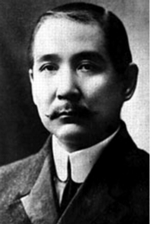Sun Yat-sen
Revolutionary, first president of the first Republic of China, b. 12 November 1866 (Hsiang-shan, Kwangtung (Canton) province, China), d. 12 March 1925 (Beijing [Peking]).
 Sun Yat-sen was the son of poor farmers in Hsiang-shan of Kwangtung province in China's south. At the age of 13 his brother, who lived in Hawaii, took him to Honolulu, where he attended a British missionary school and an American college school. After four years, when Sun developed a strong interest in Christian ideas, he was sent back to his village.
Sun Yat-sen was the son of poor farmers in Hsiang-shan of Kwangtung province in China's south. At the age of 13 his brother, who lived in Hawaii, took him to Honolulu, where he attended a British missionary school and an American college school. After four years, when Sun developed a strong interest in Christian ideas, he was sent back to his village.
For the next ten years (between 1883 and 1892) Sun attended various schools and eventually graduated from the College of Medicine for Chinese in the British colony of Hongkong. He married the girld selected by his parents and was baptized by an American missionary.
Like many Chinese students Sun was angered by the humiliation his country suffered from western forces and how it was left behind in the area of technological development. In 1894 he abandoned his medical practice and applied to the governor-general of Chihli with a letter that contained his ideas for China's future. Having received only a reference that endorsed his idea of setting up an agricultural organisation, he travelled to Hawaii, where he founded the "Revive China Society".
Sun's first attempt at a revolutionary uprising came after China's defeat in the war with Japan of 1894-1895. Sun returned to Hongkong and tried to instigate an uprising in Kwangtung (Canton), his native province. The attempt failed, and Sun went into exile.
In the following year Sun was recognised in London and detained by the Chinese legation, which planned to hand him back to the Chinese government. With the help of a sympathetic legation employeee Sun managed to get word of his detainment out, and after 13 days he was released after intervention by the British Foreign Office. This event made his name known amongst Chinese all around the world, and during the following years Sun received financial and organizational support from many sides. Sun set up and organized secret revolutionary cells of Chinese students and intellectuals in Europe. In 1905 he founded the "Alliance Society" in Japan and edited its "People's Journal".
Sun's revolutionary activities were not overly successful but caused the host governments some discomfort. In 1907 the Japanese government asked Sun to leave the country and gave him a substantial sum of money on his way. Sun went on a tour of the United States and Canada, raising more funds and preparing another uprising for Canton.
The attempt in March 1911 failed again, and Sun had to flee the contry. But the ongoing unrest had weakened the ruling Ch'ing dynasty, who since 1901 had tried to control the situation by introducing piecemeal reform. In October 1911 Sun learned from the newspapers in Denver, USA, that a revolutionary group in Wu-han had been successful in overthrowing the provincial government. He immediately returned to China and was elected provisional president of the Republic.
Recognising the weakness of his position Su negotiated with the Imperial first minister, Yüan Shih-k'ai. On 12 February 1912 the Emperor abdicated; Sun resigned the following day, handing over the presidency to Yüan.
In March 1913 the leader of the Kuomintang (Nationalist Party, the successor of the "Alliance Society") was murdered, apparently under orders from Yüan. A second uprising, directed against Yüan, failed, and Sun had to leave China again. He returned in 1916, after the fall of Yüan from internal struggles, took over the leadership of the Kuomintang and began a long struggle against the reactionary government, seeking help from whoever was prepared to assist.
After the success of the Russian revolution the Soviet government established contact with the Kuomintang. In a joint manifesto of 1923 both sides declared that the Communist system was not suitable for China. The Chinese Communist Party, which had been formed by Mao Zedong in 1921, collaborated with the Kuomintang, which elected three communists into its central executive committee.
When Sun Yat-sen died from cancer in 1925, the Kuomintang was a strong and disciplined force in Chinese politics, working in collaboration with the rising Communist Party for the establishment of a nationwide republic.
Sun Yat-sen was a person who radiated determination for progress. His three principles "Nationalism, Democracy, Peoples' Livelihood", which included the regulation of private capital and the "equalization of land rights", were a programme for national revolution. His ability to cooperate with others was aided by a great tolerance towards the weakness of others. The Chinese Communist Party gave him the title "pioneer of the revolution".
home
 Sun Yat-sen was the son of poor farmers in Hsiang-shan of Kwangtung province in China's south. At the age of 13 his brother, who lived in Hawaii, took him to Honolulu, where he attended a British missionary school and an American college school. After four years, when Sun developed a strong interest in Christian ideas, he was sent back to his village.
Sun Yat-sen was the son of poor farmers in Hsiang-shan of Kwangtung province in China's south. At the age of 13 his brother, who lived in Hawaii, took him to Honolulu, where he attended a British missionary school and an American college school. After four years, when Sun developed a strong interest in Christian ideas, he was sent back to his village.